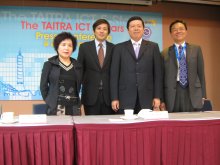 I was brought up to believe that being a reporter is a pretty cool thing.
I was brought up to believe that being a reporter is a pretty cool thing.
One important lesson of my career is that most people don't think so. The assumption of a reporter as hero is, generally, an American assumption.
In much of the world, especially Asia, a reporter is either a stenographer or a threat to civil order. This may be why nominal democracies there don't act the way they do here. That is, it takes an enormous effort to dump a government because the truth-telling role of journalists is assumed not to exist.
I got an unexpected taste of this at CompuTex. The Taiwanese authorities (above) held a press conference on the third day of the show. The four bureaucrats sat at their table, they read their statements, they asked for questions.
Except for me, there was silence. I asked a question, got an answer. Waited a while and asked another. I thought I was being polite. These people had gone to great trouble to speak with us. They laid out coffee, cakes, and lunch. The least I could do, I thought, was to take what they said seriously, to ask some serious questions, and follow up.
Not true. A Europe-based reporter clued me in. They were shocked to be asked real questions, he said. They expected that reporters would repeat what they said, verbatim, and leave it at that.
Self-censorship is a bad habit, but that's the habit of most reporters around the world. At least most of those who get paid for it.

What else could I do? I did something I never do, something I am not authorized to do, something that might cost me my own job as well as his. I edited a very old story, neutered it, wrecked it. Twice.
I had assumed my own rules applied when I talked to my friend. But I was on his ground, in his culture. If I wanted to apply my rules I should have discussed the matter first. It was my mistake all around.
The idea of reporters as truth-tellers is an important part of democracy. It keeps people on their toes — in business, in sports, in entertainment, in politics. Sure, a lot of reporters cross ethical lines. Sure, there are gazillionaires who use their control of media outlets for their personal advantage. Such corruption is routine.
But in every western case there are other reporters, outside the orbits of the corrupt, who are calling them on it. Thanks to the Internet these stories cross political boundaries. Thanks to the rise of English they can have international power.
But this lesson has not been driven home. This is partly due to the fact that, when American might reached Asia, there were strict military controls. MacArthur demanded, and got, a pliant press. What happened in Vietnam was an exception, and it applied only to Americans.
There are enormous long-term benefits in accepting the role of reporters as truth-tellers. There are also short-term costs. Bureaucrats and politicians and corrupt businessmen can lose their cushy sinecures when reporters are allowed to roam free. So there is systemic pressure placed on people, from the bottom of the society to the top, not to rock the boat.
Unfortunately, boat-rocking is an important component of democracy. How are people to exercise choice if no one is offering them honest, unbiased (or unbiased in their own eyes) information? How are people to be free if they're not able to conduct their own balancing of fact and unfettered opinion, if the choices they are offered are binary — pro-system or anti-system — rather than analog and organic.
Reporters are not, as I was taught, people who work for people who buy ink by the barrel. We are ordinary people, highly fallible, learning what we can, guessing when we don't, whose credibility you measure.
I guess you should feel good about this, if you're an American. Because Asian businessmen and bureaucrats aren't made to listen, and respect the fact-gathering and opinions of ordinary people, their societies are much more inelastic than they would otherwise be. They are highly resistant to change, they adapt slowly, and so they confer on Americans (and Europeans) an enormous advantage that lets so many of us stay lazy and still make a living.
It's only when China gets this Clue that we will have any reason to be concerned about our own place in the future.









